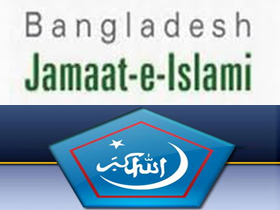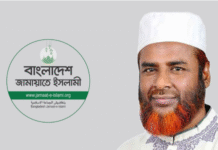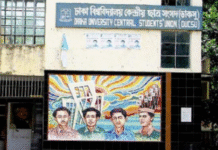Sources told the Dhaka Tribune that the drafting section of the Law Ministry had almost completed preparing the draft
The government has decided not to change its stance regarding trying Jamaat-e-Islami for its alleged crimes against humanity during 1971, despite US Ambassador-at-Large Stephen J Rapp’s recent suggestions against trying a political party for such crimes.
Sparing Jamaat from the war crimes trial was a personal view of the US ambassador-at-large, Law Minister Anisul Huq said, adding that the government would move forward on its own way regarding the trial.
As far as Bangladesh was concerned, the government’s first priority was to respect its people’s wishes, the minister told the Dhaka Tribune on Sunday.
During his visit to Dhaka last week, Rapp, the US ambassador-at-large on war crimes issue, said no political party should be tried for crimes against humanity, and the focus should be given on individuals who committed the crime. Without mentioning the name of Jamaat-e-Islami, Rapp also said the crimes in 1971 were committed by individuals and not everybody in a political party.
In his reaction to Rapp’s comment about using “the criminal process to prosecute a political party or a large group,” the law minister reiterated that the government had launched initiatives to further amend the International Crimes (Tribunals) Act 1973 to specify the punishment against organisations for their crimes against humanity.
The existing ICT Act includes a provision for trying an organisation for its alleged crimes against humanity, but does not specify what punishment would be handed to the organisation if it is found guilty.
Sources told the Dhaka Tribune that the drafting section of the Law Ministry had almost completed preparing the draft.
Meanwhile, asked about the US diplomat’s recent remarks, prosecutor Tureen Afroz said: “Ambassador Rapp has expressed his views on the matter of the trial of organisation. It could be his personal or official position, but the ICT law does not depend upon what he or the USA or in that matter, any other country will think.
“At the tribunal, we are having the trial under our own law,” she added.
Conducting prosecutors had been claiming that it was possible to try Jamaat based on the existing law.
Tureen said: “Section 20 (2) of the ICT Act suggests that the judges can mete out any punishment to a person, if convicted, ranging from death penalty to a ban. Jamaat can be punished under the ICT act as a legal person.”
Commenting on the government initiative to amend the act, she expressed hopes that the amendment would clarify on the punishment of organisations.
On the other hand, war crimes campaigner Shahriar Kabir said Rapp was not the authority to say anything on Bangladesh’s war crime trials, adding that Jamaat must face trial.
He said the Foreign Ministry needed to maintain a strong policy for having a good understanding with “powerful countries.” He added that there was a need for advocacy to create a better image of the war crimes trial, while the other countries also needed to know that the war crimes trial was an internal issue of Bangladesh.
“The US considers Jamaat as a moderate Islamist party; and knowing about all its terrorist activities, the US wants continuation of terrorism to keep the opportunity of military intervention. The US is doing all these to maintain their double-standard character,” Shahriar Kabir claimed.
During his fifth visit to Dhaka, Rapp did not make any comment regarding Jamaat’s trial when he met with the prosecution team at their office and paid a courtesy visit to the tribunal. He only expressed his observations on trial against political parties during his meeting with the law minister and at a press conference in the American Centre.
On February 25, the tribuna’s probe team submitted report on Jamaat, bringing charges of crimes against humanity, genocide, war crimes any other crimes under international law and attempt, abatement or conspiracy to commit any such crimes.
Source: Dhaka Tribune










